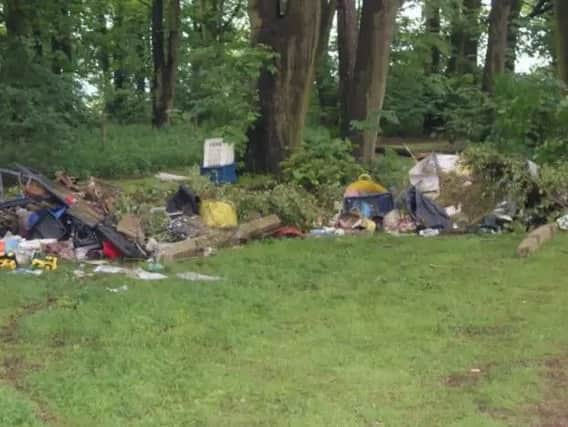Fly-tipping 'alarmingly high' as 18,393 incidents reported in Northampton in one year


Nationally there were just under one million fly-tipping incidents recorded by local councils in the last year, a decrease of just one per cent from 2016/2017 to 2017/2018.
In Northampton alone, 10,519 small load van incidents were reported as well as 13,168 other household waste incidents, 11,533 footpath and bridleway incidents and 682 white goods were reported to the Guildhall too.
Advertisement
Hide AdAdvertisement
Hide AdOverall, 18,393 fly-tipping incidents were reported to the Guildhall from 2017 to 2018 and of these incidents the borough council only took action against 1,066 incidents.
Eight people were given total fixed penalty notice actions.
Emma Heath, who manages Northampton's Rubbish Twitter account, said: "It's good in some ways because people are taking time to report things. My worry I don't think they'll give up as it's relentless. Day to day I've noticed with the increase of HMOs and other rental properties has come an increase of stuff just put out in the street.
"Hunter Street is horrendous and I know some streets in Overstone Road are too.
"I'm not sure if people are unaware it's an offence, if they simply don't care or feel they have no choice. I'd like to see landlords taking more responsibility but with tip restrictions I can only see it getting worse."
Advertisement
Hide AdAdvertisement
Hide AdAnita Kiely used an unauthorised waste collection service to discard of her household waste in May this year. Letters with her name and address on were discovered at Ecton Lane, Sywell, where a resident found masses of rubbish dumped on his driveway and reported it Wellingborough Council.
When questioned, Kiely claimed she had paid two men to do gardening work for her and take away some household rubbish but she could not provide officers with their details. Kiely pleaded guilty at Northampton Magistrates' Court on November 6 and was fined £1,000, ordered to pay costs of £1,075 and a £100 victim surcharge.
Out of 997,553 fly-tipping incidents nationally in 2017/2018, 137 vehicles were seized (down from 197 in 2016/2017), and out of 2,243 prosecutions, 1,938 fines were imposed, most commonly between £200-500.
The true figures for fly-tipping are likely to be significantly higher however as the latest statistics do not include incidents of fly-tipping on private land, where the landowner has responsibility to oversee the clearance and cost for waste removal.
Advertisement
Hide AdAdvertisement
Hide AdCountry Land and Business Association (CLA) regional surveyor Tim Woodward said: “The new statistics present a mixed picture for our region but the reality is that fly-tipping incidents remain alarmingly high.
“The real overall figures are also likely to be considerably higher as many incidents go unrecorded and unreported because they take place on private land and are not included in these statistics.
“Private landowners are liable for any waste dumped on their land and are fed up of clearing away other people’s mess and paying for the privilege."
The CLA welcomed an independent review published yesterday that identified fly-tipping as a key element of serious and organised waste crime.
Advertisement
Hide AdAdvertisement
Hide Ad“It is vital that more prosecutions are brought forward successfully to encourage people to do the right thing and dispose of their rubbish through proper legal channels. Councils must send a clear message to fly-tippers that they will face financial consequences.
“But to really combat this crime against the countryside we need to see tougher penalties which act as a true deterrent. Imposing and enforcing penalties which better reflect the seriousness of the crime, such as seizing vehicles used to fly-tip, is crucial.
“There must be stronger action to combat fly-tipping if we are to have any chance of tackling this blight on the countryside.”
